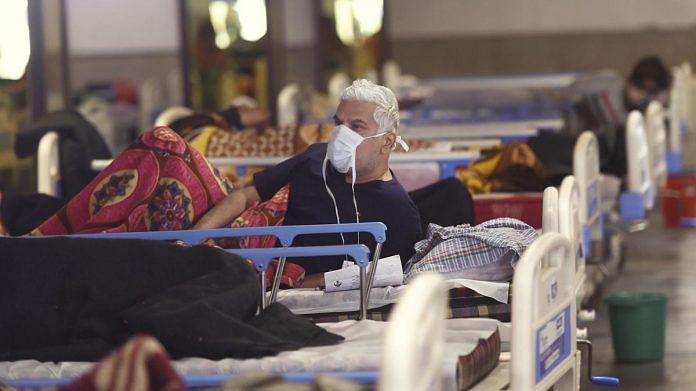New Delhi: The Delta variant of SARS-CoV-2 is highly transmissible, and has improved immune escape properties — lowering the protection granted from previous infections by upto 60 per cent, according to a study by researchers of INSACOG, the Imperial College London and the University of Copenhagen.
The Indian SARS-CoV-2 Consortium on Genomics or INSACOG is a pan-India network of laboratories to monitor genomic variations in the novel coronavirus.
The team looked at data from the fourth Covid wave (when India saw its second wave overall) in Delhi, which overwhelmed the healthcare systems in the capital despite a reported seropositivity of 50 per cent.
The research, which was posted on medRxiv and is yet to be peer reviewed, brought together data from modelling studies, sero-surveys, as well as the structural insights into the spike protein of the mutated virus.
Also read: We found more than 54,000 viruses in people’s poop — 92% were previously unknown
India, the entry point
The team noted that the Alpha (B.1.1.7) variant — first identified in the UK — entered northern India in February this year, which led to regional outbreaks that stretched the healthcare system. However, cases were within the capacity of the healthcare systems.
From March, the introduction of Kappa (B.1.617.1) and Delta (B.1.617.2) variants led to a further rapid rise in new cases. Soon, the Alpha and Kappa lineages were overtaken by Delta.
This led to a 10-fold rise in new cases in April in Delhi, from about 2,500 to 25,000 daily cases in a span of two weeks. This severely stressed the healthcare system, with daily deaths spiking to levels three folds higher than previous waves, the team said.
Modelling studies conducted by the team showed the Delta variant is able to partially evade the protective immunity conferred by prior infection. Prior infection in some cases just provided only 50 per cent of the protection against infection with the Delta variant that it provides against previous lineages.
To determine whether there was actual evidence of reinfection during the outbreak, the team conducted a serological survey in June for the staff of one laboratory at CSIR. A serological survey analyses the percentage of population that has antibodies against the disease.
In February, 172 (45 per cent) of the 379 participants in the survey had been seropositive. In June, the 196 participants (85%) of the total 231 surveyed were found to be seropositive.
In the third phase, researchers only included participants who had previously participated in the surveys. This included 76 people, out of which 65 (86%) were seropositive. Among these 65, there was serologic evidence of reinfection in nine cases.
The team also sequenced all samples of vaccination-breakthrough cases at a single centre in Delhi over the period of the study. Among 27 cases, 19 (76%) were Delta and 2 Kappa (8%). The prevalence of Delta in breakthrough infections was much more than expected. Alpha variant was not detected in vaccination breakthroughs.
Also read: Face mask that can detect Covid in 90 mins — MIT, Harvard scientists come up with new tech
Reasons for increased transmission
The team also looked at the structural changes in the spike protein of the mutated virus to understand what contributed to the increased transmission. They generated a structural model representing B.1.617.2 spike protein, which provides insights into the plausible mechanisms of virus entry and binding.
The T478K mutation, in addition to previously reported L452R in B.1.617.2, had a role to play in the increased transmissibility, according to the team. Both genomic and serologic evidence in the study shows the Delta variant was associated with high viral load, transmissibility, vaccination breakthrough, and reinfection.
From the available data, the researchers inferred that Delta transmissibility may be 30-60 per cent higher than the previous strains of SARS-CoV-2 circulating in Delhi.
The study estimates that protection from prior infections by lineages excluding B.1.617, would be reduced by 12 to 60 per cent. “Overall, we note that the Delta variant is capable of creating very fast-rising outbreaks with vaccination breakthroughs. We would re-emphasize that prior infections, high seropositivity and low vaccination coverage are insufficient impediments to its spread, as seen in Delhi, and a strong public health response will be needed globally for its containment,” the team concluded.
Also read: UK & Indian Covid strains two most widely circulated mutant variants in India, scientists find



